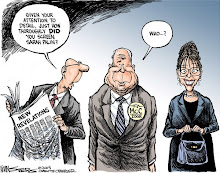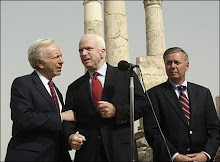By Fred Kaplan
July 23, 2008,
Slate Magazine
After Barack Obama's opening day in Iraq this week, the New York Times headline read, "For Obama, a First Step Is Not a Misstep." The story, by Richard Oppel Jr. and Jeff Zeleny,noted, "Mr. Obama seemed to have navigated one of the riskiest parts of a weeklong international trip without a noticeable hitch."
That was the big nail-biter: Would Obama, the first-term senator and foreign-policy newbie, utter an irrevocably damaging gaffe? The nightmare scenarios were endless. Maybe he would refer to "the Iraq-Pakistan border," or call the Czech Republic
"Czechoslovakia" (three times), or confuse Sunni with Shiite, or say that the U.S. troop surge preceded (and therefore caused) the Sunni Awakening in Anbar province.
But, of course, it was Obama's opponent, John McCain—the war hero and ranking member of the Senate Armed Services Committee—who uttered these eyebrow-raisers.
"Czechoslovakia" was clearly a gaffe, and understandable for anyone who was sentient during the Cold War years. What about the others, though? Were they gaffes—slips of the tongue, blips of momentary fatigue? Or did they reflect lazy thinking, conceptual confusion, a mind frame clouded by clichéd abstractions?
If Obama had blurted even one of those inanities (especially the one about the Iraq-Pakistan border), the media and the McCain campaign would have been all over him like red ants on a wounded puppy.McCain caught almost no hell for his statements—they were barely noted in the mainstream press—most likely because they didn't fit the campaign's "narrative." McCain is "experienced" in national-security matters; therefore, if he says something that's dumb or factually wrong, it's a gaffe or he's tired. Obama is "inexperienced," so if he were to go off the rails, it would be a sign of his clear unsuitability for the job of commander in chief.
It may be time to reassess this narrative's premise—or to abandon it altogether and simply examine the evidence before us. Quite apart from the gaffes, in formal prepared speeches, McCain has proposed certain actions and policies that raise serious questions about his suitability for the highest office. As president, he has said, he would boot Russia out of the G-8 on the grounds that its leaders don't share the West's values. He would form an international "League of Democracy" as a united front against the forces of autocracy and terror. And though it's not exactly a stated policy, he continues to employ as his foreign-policy adviser an outspoken, second-tier neoconservative named Randy Scheunemann, who coined the term "rogue-state rollback" and still prescribes it as sound policy.
Evicting Russia from the group of eight leading industrial nations may have some visceral appeal, but it has at least two drawbacks. First, all the G-8's other members are opposed to the notion. Second, the main issues that concern the G-8—for instance, climate change, energy policy, nuclear nonproliferation, and counterterrorism—cannot be fully addressed without Russia's participation.
The idea of a League of Democracy has a nice ring, especially given the United Nations' frequent obstructionism in the face of human misery and common danger. The obstructionism stems in part from vetoes by Russia or China, which, of course, would not be members of this league. But there are a few problems here as well. First, democratic nations often differ on high-profile issues (e.g., the invasion of Iraq, the rules of engagement in Afghanistan, the Kyoto Treaty, etc.). Second, very few of the world's pressing problems break down along the lines of democracies vs. nondemocracies, either by topic or constituency. Third, creating such an overtly ideological bloc as a central tool of foreign policy would only alienate the excluded nations—and possibly incite them to form an opposing bloc. The challenge is to find common solutions to global problems, not to encumber them in a new Cold War.
As for rolling back rogue states, one would hope that McCain has learned some lessons from George W. Bush's failures as even Bush himself has done, albeit belatedly—for instance, in deciding to negotiate with the North Koreans (though not until after they tested an atomic bomb). Someone should ask McCain: Would he cut off those talks? Does he value Scheunemann's advice? If so, which rogues does he hope to topple next, and with whose army does he plan to do it? (Ours is overbooked at the moment.)
In other words, how much does John McCain really know about foreign policy after all? It's a question to be asked and answered, not brushed away as impertinent.
Subscribe to:
Post Comments (Atom)




No comments:
Post a Comment